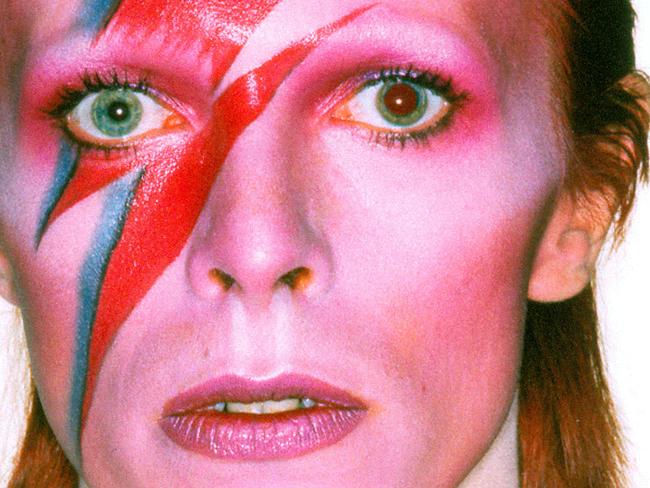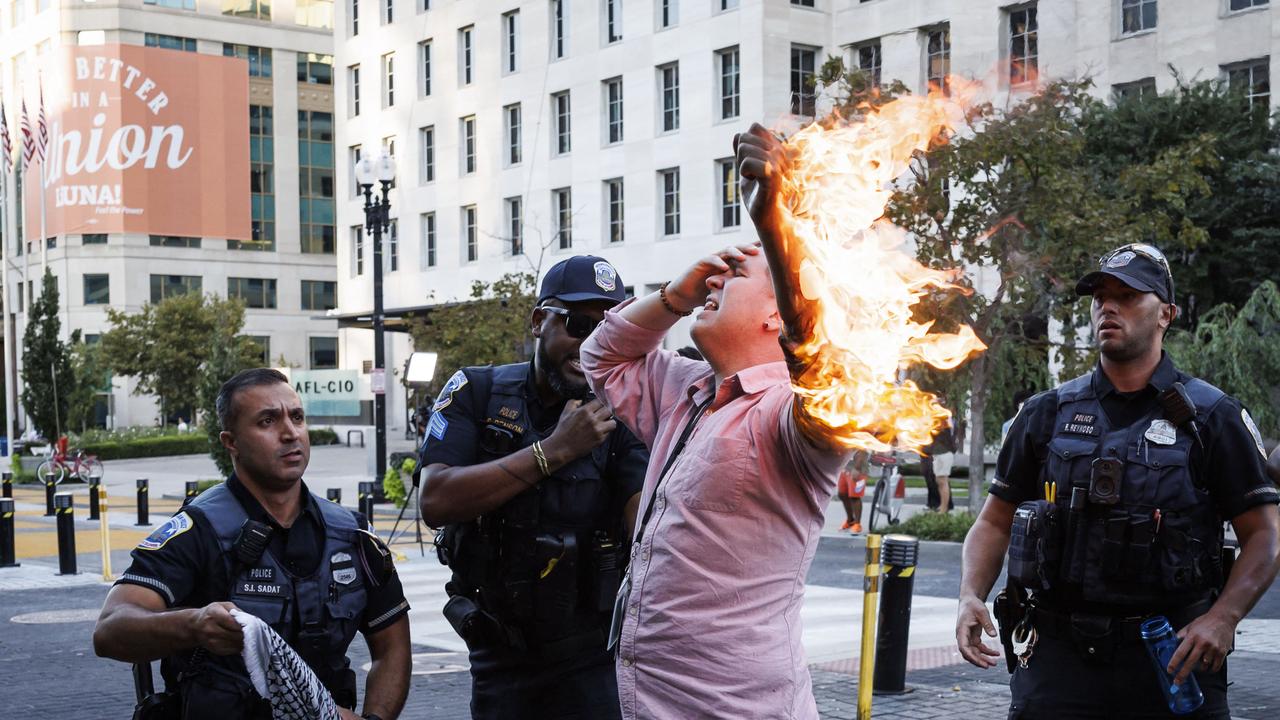David Bowie dead: music legend dies at 69 after cancer battle
David Bowie, who has passed away after a battle with cancer, was an innovator and an agent provocateur.
He was always one step ahead of the game, even at the end.
When David Bowie released his final album, Blackstar, on his birthday last Friday, it was hailed immediately by critics for its confounding modernity, confirming Bowie’s status as an innovator, an agent provocateur, one of rock’s greatest originals.
His death from cancer at the age of 69, announced on his official website, has shocked the world, not least because it came at a time when praise for his latest work ignited speculation about his possible return to the stage, even though he had been shy of public appearances for 10 years. “David Bowie died peacefully today surrounded by his family after a courageous 18- month battle with cancer,” read the official statement.
“While many of you will share in this loss, we ask that you respect the family’s privacy during their time of grief.”
Rumours of the singer’s death began to appear online at the weekend, but were thought to be a hoax prompted by the release of the new album. The singer had been battling cancer for the past 18 months. He underwent heart surgery in 2004 following a heart attack at a concert in Germany.
Bowie gave his last performances in Australia earlier that year. At a news conference in Sydney he said he was more concerned with being a live attraction, since he no longer was a fixture on contemporary radio. “I rely more on word of mouth now about how good we are on stage ... which of course we are,’’ he said.
Thousands of tributes flooded the media and the internet yesterday, including one from British Prime Minister David Cameron. “I grew up listening to and watching the pop genius David Bowie,” he said. “He was a master of re-invention who kept getting it right. A huge loss.”
US hip-hop star and producer Kanye West said Bowie was “one of my most important inspirations, so fearless, so creative, he gave us magic for a lifetime”.
US singer Madonna said: “I’m devastated. This great icon changed my life! First concert I ever saw in Detroit.”
Scottish singer Midge Ure said: “He gave us the point to run towards, we are all still trying to run towards that, everyone.”
Bowie rose to prominence in the late 1960s with the single Space Oddity, although he had been hovering around the pop scene in London for several years, first as Davy Jones and the King Bees, and then as David Jones, but reportedly changed it to Bowie to avoid confusion with the Monkees’ Davy Jones.
By the early 70s Bowie had announced himself as one of rock ’n’ roll’s great innovators with albums such as The Man Who Sold the World (1970), Hunky Dory (1971) and, most successfully, The Rise and Fall of Ziggy Stardust and the Spiders From Mars (1972), an album that not only produced the hit Starman but also long-serving stage favourites Suffragette City and Rock ’n’ Roll Suicide. It also introduced the singer’s theatrical nature.
Costumes became part of his artistry, fashion almost as important to his image as the music.
Australians flocked to see examples of his many guises last year at the David Bowie Is exhibition in Melbourne. More than 200,000 attended the exhibition at the Australian Centre for the Moving Image between July and November, while the equivalent show at London’s Victoria and Albert Museum was the fastest selling event in its history and drew 312,000 visitors.
Through the 70s — his most intense and fruitful period of writing and recording — Bowie changed his persona and his musical style frequently. Albums Station to Station and Young Americans were soul and funk oriented, while his much-revered Berlin period of the late 70s, which produced the albums Low, Heroes and Lodger, took him into a more electronic domain. In the 1980s he changed tack again with a more polished rock sound on the albums Scary Monsters (and Super Creeps) and Let’s Dance and had a hit, Under Pressure, with Queen. As his career progressed in the 80s and 90s he continued to re-invent himself, under his own name and in collaborative projects such as the band Tin Machine.
Whether as a glam-rock star or in any of his many guises, Bowie’s music appeared from outside the zeitgeist, although in an interview for The Australian in 2004 he was inspired by the present.
“One of the fortunate things and benefits to me as an artist is that I’ve always felt pretty much in the now,” he said. “I’ve not been a nostalgist too much, which has allowed me to be fairly free with what’s going on today and be a lot more involved in whatever society I’m living in, and writing from it and being stimulated by it.’’
In tandem with his music career Bowie achieved some fame and notoriety as an actor, landing lead roles in films such as The Man Who Fell to Earth, Merry Christmas Mr Lawrence, Just a Gigolo and Labyrinth. His most recent appearances on screen were for the videos for two songs from his final album, the title track and the song Lazarus, in which he is seen lying in a hospital bed with his eyes bandaged.
Bowie is survived by his wife Iman and their 15-year-old daughter Alexandria. Bowie has a son, film-director Duncan Jones, formerly Zowie Bowie, from his marriage to Angie (Barnett) Bowie in the 1970s. Jones yesterday confirmed his father’s death, tweeting: “Very sorry and sad to say it’s true. I’ll be offline for a while. Love to all.”
In 2013, also on his birthday, Bowie released The Next Day, his first studio album in 10 years. It enjoyed positive reviews, while it was made clear at the time that there would be no touring to accompany it. With Blackstar, fans were hopeful that there might be a return to the stage for the man once dubbed The Thin White Duke. It was not to be.
During that same 2004 interview, he talked enthusiastically about his love for the stage.
“It’s more important to me that I can actually continue to work ... and the fact that I’m getting a really enthusiastic audience ... that’s really fulfilling,” he said. “I’m getting to that age and that stage now where the only thing that would depress me is if I didn’t have an audience any more. I’ve gotten past worrying about the way things are received.’’





